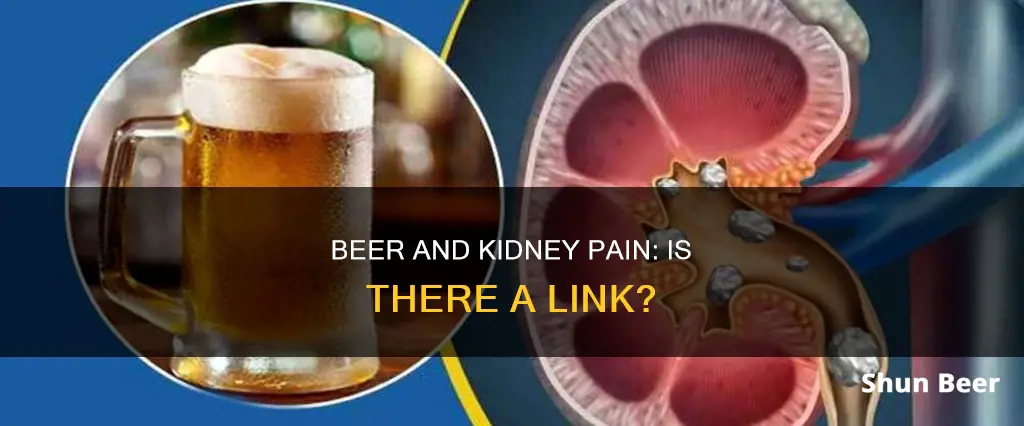
Drinking beer can cause kidney pain. Beer, like other alcoholic drinks, can lead to dehydration, which can cause kidney stones and acute kidney injury. Alcohol also suppresses the vasopressin hormone, which regulates urination, causing further dehydration. In addition, alcohol affects the kidneys' ability to maintain water balance and filter blood, leading to impaired kidney function and an increased risk of developing kidney stones. Liver disease caused by alcohol consumption can also affect kidney function. Therefore, it is important to drink in moderation or abstain from alcohol to protect kidney health.
| Characteristics | Values |
|---|---|
| Kidney pain after drinking beer | Yes |
| Reasons | Dehydration, inflammation of stomach lining, other health conditions like kidney infection, liver disease, kidney stones, UTI, gastritis |
| Symptoms | Swelling of legs, ankles, face, chest pressure, nausea, vomiting, trouble breathing, fatigue, trouble sleeping, swollen face or legs, chest pressure, nausea, and/or vomiting, difficulty urinating, abdominal or back pain, frequent urination, fever, dull ache, sudden sharp pain, soreness under rib cage, pain that worsens at night |
| Treatment | Antibiotics, rehydration, surgery, medication, heat, pain medicine, dialysis |
| Prevention | Limit alcohol intake, drink water, avoid binge drinking, swap hard liquor for beer or wine |

Acute kidney injury
Binge drinking or drinking numerous alcoholic beverages in a short time can lead to acute kidney injury. Acute kidney injury can occur when waste builds up in the blood faster than the kidneys can filter it out. This can be caused by the kidneys having to work harder to filter out the alcohol from the blood, which can be exacerbated by dehydration caused by alcohol's diuretic properties.
In addition to kidney pain, symptoms of acute kidney injury include:
- Swollen legs, ankles, or face
- Difficulty breathing or shortness of breath
- Chest pressure or pain
Without treatment, acute kidney injury can lead to seizures or a coma. Acute kidney injury usually goes away over time, but it can sometimes lead to lasting kidney damage. It is important to seek medical attention if you are experiencing kidney pain or other symptoms of acute kidney injury.
Non-Alcoholic Beer: Healthy Daily Habit or Not?
You may want to see also

Urinary tract infection
Alcohol consumption can increase the risk of developing a UTI. It can irritate the bladder, impact the body's ability to fight infections, and increase urine acidity, which can worsen UTI symptoms. Alcohol is a diuretic, increasing the frequency of urination and contributing to dehydration, which can cause bladder irritation and pain during urination.
Drinking alcohol while taking antibiotics for a UTI may also lead to side effects such as drowsiness and an upset stomach. It is recommended to avoid alcohol and instead drink plenty of water and cranberry juice to help ease UTI symptoms and prevent future infections.
To prevent UTIs, it is essential to maintain proper hydration and avoid excessive alcohol consumption. Additionally, certain foods and drinks, such as artificial sweeteners, spicy foods, coffee, acidic fruits, citrus, and caffeinated beverages, can irritate the bladder and worsen UTI symptoms.
Beer Traps: Effective Earwig Control or Urban Myth?
You may want to see also

Dehydration
When the body is dehydrated, it cannot effectively regulate its temperature or perform other essential functions, such as waste removal. Dehydration can lead to an accumulation of waste in the kidneys, causing pain.
Alcohol consumption can contribute to dehydration. It has diuretic properties, causing increased urination and subsequent fluid loss. This can lead to dehydration, especially when consumed in excess.
To treat dehydration, it is important to replace lost fluids and electrolytes. Sports drinks containing electrolytes and carbohydrate solutions are recommended. In some cases, medical attention may be required.
It is important to note that while dehydration can cause kidney pain, there are also other potential causes, such as kidney stones, infections, or injury. If you are experiencing kidney pain, it is recommended to consult a doctor to determine the underlying cause and receive appropriate treatment.
Beer Ads and Drinking: Is It Allowed?
You may want to see also

Liver disease
Alcohol-associated liver disease is common but preventable. There are three types of alcohol-associated liver disease: steatotic (fatty) liver, acute hepatitis, and cirrhosis. The liver's job is to break down alcohol, but if you drink more than it can process, it can become badly damaged.
Steatotic (fatty) liver is the most common alcohol-induced liver problem. It is caused by a build-up of fat inside the liver cells, which leads to an enlarged liver. This condition rarely causes any symptoms, but it is an important warning sign that you are drinking at a harmful level.
Acute hepatitis is an acute inflammation of the liver, which results in the death of liver cells, often followed by permanent scarring. Alcoholic hepatitis can be mild or severe. In mild cases, liver damage occurs slowly over the course of many years. Severe alcoholic hepatitis can be life-threatening and can come on suddenly, such as after binge drinking.
Cirrhosis is the destruction of normal liver tissue, which is replaced by scar tissue. The liver may stop working correctly as a result. Cirrhosis is generally not reversible, but stopping drinking alcohol immediately can prevent further damage and increase your life expectancy.
The most important part of treating alcohol-associated liver disease is to stop drinking alcohol completely. In some cases, a liver transplant may be necessary.
If you experience kidney pain after drinking alcohol, it is important to pay attention to your body and consider reducing your alcohol intake or taking a complete break from alcohol for a set amount of time.
Beer and Lipitor: Safe Mix or Health Risk?
You may want to see also

Kidney stones
Beer is a diuretic, which means it increases urine production. This can help pass small stones of less than 5mm, as the exit passage is only 3mm. However, if the kidney is already blocked by a stone, drinking beer can be dangerous as it will produce more urine than the body can expel, leading to pain and vomiting.
Prolonged beer intake can also cause dehydration, which is a risk factor for kidney stones. Beer consumption can also lead to weight gain, and obesity is another risk factor for kidney stone formation. Additionally, beer contains constituents that can increase uric acid levels in the body, further increasing the risk of uric acid crystals in the kidneys.
To prevent kidney stones, it is recommended to avoid oxalate-rich foods, drink plenty of water, and be cautious with sodium intake, as sodium can increase calcium levels in urine, promoting stone formation.
Beer and Teeth Whitening: What You Need to Know
You may want to see also
Frequently asked questions
Yes, the areas around your kidneys may feel sore or uncomfortable after drinking beer.
You may feel a dull ache or sudden, sharp, stabbing pain. The discomfort may be mild or severe and manifest on one or both sides of the body.
There are several causes, including liver disease, kidney stones, and urinary tract infections. Binge drinking can also lead to acute kidney injury.
If you want to avoid kidney-related pain after drinking beer, consider reducing your alcohol intake. Swap out hard liquor for beer or wine, and avoid binge drinking.
Kidney pain after drinking alcohol should not be ignored. If you experience sudden or severe kidney pain after drinking, schedule an appointment with your healthcare provider immediately.







